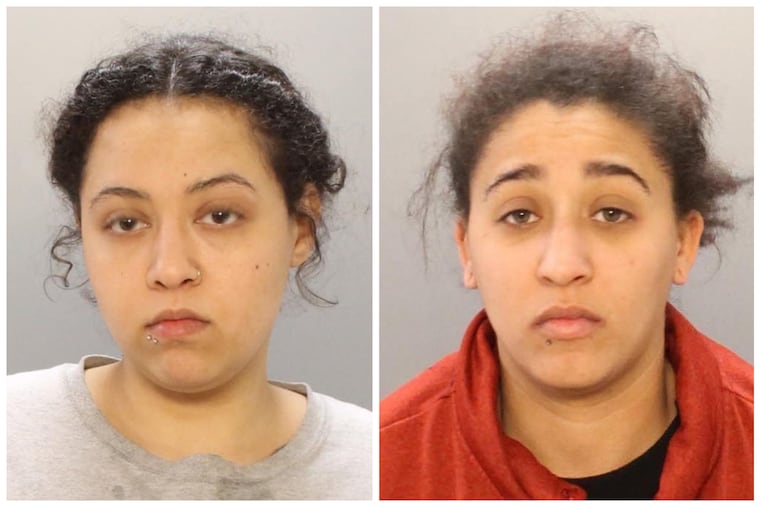A relationship that began in the ‘dark’ ended in death for a Philly man, murder charges for two West Chester women
Two Montgomery County women await trial for the 2017 murder of an Overbrook Park man who was bound, stabbed, and set on fire in his home. They met on the dark web, a shadowy place frequently linked to illegal activity, including murder.

The murder and mutilation of Rephael Brandon Swan was as brutal as it was baffling.
Swan, 29, was found in the bedroom of his Overbrook Park basement apartment, his hands bound by a belt, his stomach, neck, chest, and right thigh punctured by 67 stab wounds. A sock was in his mouth, and his body had been set ablaze in bed.
Two years passed before Philadelphia police had enough evidence to charge two West Chester women in the September 2017 slaying. Now Cheyenne Hurt and Kayla Garforth, who are married, are accusing each other of being the killer.
“I’m not surprised in a case like this that one person will try to point the finger at the other person, and the other person would point the finger back at the other person,” said Hurt’s attorney, Michael McDermott. “They’re both in a tight spot right now.”
Garforth is cooperating with the District Attorney’s Office, said her attorney, David Nenner. She hopes the murder charge against her will be dropped in exchange for her testimony against Hurt, who Nenner said killed Swan in a fit of rage while the two were having sex as Garforth watched. She has a pretrial conference scheduled for March 18.
Defendants charged in the same crime in Philadelphia are usually tried together. But the cases of Hurt and Garforth are assigned to two judges, court records show. Hurt’s trial is scheduled to begin Sept. 21; no trial date has been set for Garforth.
Assistant District Attorney Courtney Malloy, who is prosecuting the case, did not return calls seeking comment.
Legally married to Hurt since 2015, Garforth, according to court testimony, later met Swan on the “dark web,” the internet layer that isn’t visible to search engines and is only accessible by special software that allows users and website operators to remain anonymous.
Lawful commerce and communication is conducted on the so-called deep web, cyber experts say. But a small part is where illicit drugs and stolen IDs are trafficked; sex-hookup and child-pornography sites flourish; hit men are hired; and money is laundered, say law enforcement officials and cyber experts.
“I can tell you that no good, typically, comes from the dark web. The technology behind the dark web was created by the U.S. Navy to give the government anonymity and invisibility on the internet.,” said Mark Lanterman, chief technology officer for Computer Forensic Services in Minneapolis, who is not involved in the case.
“Just like every other tool, some people use it for good, some people use it for bad, and unfortunately, the dark web as a tool tends to be used for bad things,” added Lanterman, a former Springfield Township, Montgomery County, police officer and a former member of the U.S. Secret Service Electronic Crimes Task Force.
Court documents show that after Garforth, now 28, and Hurt, now 25, met Swan, the three’s relationship included sex and drugs.
Although two years passed before Hurt and Garforth were charged in the murder, they were suspects within two months of the slaying, according to the affidavit of probable cause for Hurt’s arrest.
On Nov. 30, 2017, a friend of the women told detectives that the couple met Swan on social media and later killed him and burned his body. Two months earlier, the witness said, Hurt had sent a text message saying, “I f—ed up,” and a day or so later wrote that someone had been killed, according to the affidavit.
Hurt told the witness she’d gone to Swan’s home for sex, tied his hands with belts, they used drugs, “something went bad sexually,” and she stabbed him repeatedly, the affidavit said.
The witness — whose name and gender were not included in the affidavit — said Hurt asked for help in cleaning up the crime scene. When the witness declined, according to the document, Hurt said that “Garforth was going to set the place … on fire.”
When the witness saw the couple a few days later, “Garforth’s right hand and knuckles were purple and bruised” and she had blisters on her right arm that looked as if she had been burned, Homicide Detective Francis Graf wrote in the affidavit.
And on Facebook, the affidavit said, Hurt left evidence: The day after the slaying, on Sept. 7, 2017, she wrote: “Stab a f— boy in his … motherf—ing face.”
A year later, on Sept. 7, 2018, the affidavit said, Hurt and a friend had a Facebook chat in which Hurt wrote: “I just realized today is the day I killed that guy. … Well, yesterday.”
Nenner maintains that Hurt committed the murder while Garforth was present but that Garforth did not take part in the slaying.
“Cheyenne just lost it,” Nenner said. “My client was begging her to stop, but she wouldn’t.”
The two women returned to the scene a few days later and started a fire in the basement apartment to destroy evidence, the lawyer said.
Lanterman, who has testified in more than 2,000 cases, called the case “bizarre” but wasn’t sure if the alleged behavior is related to the dark web.
“I would argue that the use of the dark web perhaps shows premeditation,” he said, "because they’re already trying to maintain anonymity and privacy.”